First Principles and What We Can Do Now
Gregory Hood, American Renaissance, December 4, 2020
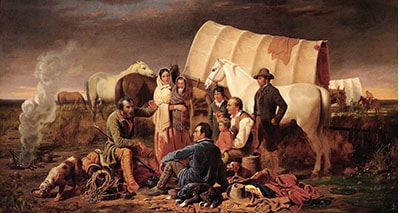
In March, I wrote about what I think should be done. My ideas included building power locally, moving to the country, and promoting secession within states. Some of these things are happening. There are movements to build a “greater Idaho,” to expel Chicago from Illinois, and to have parts of Virginia join West Virginia. However, in my earlier essay, I made a mistake.
A good friend recently told me that there is no political solution. He’s wrong, and I was too, when I wrote in March that we should create “non-political” institutions. There’s no such thing as a non-political institution. I should have said “non-partisan” or “non-electoral.” There may not be an electoral solution for whites on a national level. However, there’s always a political solution. There will always be politics, because politics is about power. Every human interaction involves power, and power is always unequal.
The leftists have a slogan: “the personal is political.” They are right when they say that ancient ideas like the family, sex roles, private property, or even pet ownership are rooted in certain ideas, systems, and assumptions. Tradition, culture, economic systems, and history shape us.
We aren’t free-floating individuals. It’s a myth that we can all each “pull ourselves up by our bootstraps.” We have autonomy, but it is limited by others’ power over us. Progressives, to their credit, understand this. They may have the right method, they have reached the wrong conclusions. There are three reasons why.
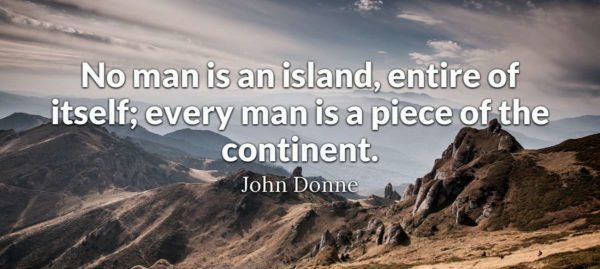
First, small-c conservatives are right about the inherent value of tradition. It is accumulated wisdom — our ancestors’ solutions to problems that will come back if we tear down what they built. There’s nothing inherently good in challenging tradition. When leftists take apart things such as “family,” “patriotism” or “sexual morality,” they forget that these things developed for a reason. The purpose of “irrational” traditions becomes clear during times of chaos. Even traditions that are irrational are important because they provide solidarity and meaning. We have compelling arguments about why we should love our children, our country, and our people, but if we even have to debate these things, we’re already in an age of dissolution.
Second, leftists neglect the most important unchosen force that shapes us. It’s not society, religion, or economics. It’s nature. Nature isn’t egalitarian. Nature just is. A socialist may scoff at a libertarian who thinks that anyone in America could become a millionaire. However, the socialist who assumes racial discrimination explains racial inequality is the bigger fool.
Individually and collectively, race also shapes who we are. Our abilities, culture, worldview, strengths, and flaws are part of us and mostly unchosen. This is offensive to some and disturbing to many because it implies limits. We don’t fully command ourselves, let alone the world.
We Western men, with our “Faustian soul,” don’t like limits. We Americans, born of a Revolution that promised, in Thomas Paine’s words, to “begin the world over again,” hate limits. Whites have a tragic fate. It’s our nature to deny nature. This includes the characteristically white ambition to end racism by ending our race. No other group acts this way or is duped so easily. We’re always driving either towards imperium or self-annihilation.

Prometheus bringing fire from the Gods.
Finally, leftists forget they aren’t the critics of the power structure. They control it. Sam Francis said egalitarianism is a political weapon. Few, he said, really believe in it and no one is seriously motivated by it, but most people are comfortable living with contradictions.
White egalitarians probably believe that they are better than other whites and are sincerely self-loathing. Analyzing that psychology would take books. However, what’s clear is that many white egalitarians feel justified using threats, economic pressure, or violence against “racists.” The definition of “racism” keeps expanding. We can’t out-argue zealots. We just need to be free of them.
However, before “we” can do anything, we have to define who “we” are. Again, Sam Francis was right when he said if “enemies come to kill us,” it won’t be because “we are ‘Americans’ or ‘Christians’ or ‘conservatives’ or ‘liberals,’ but because we are white.” (I would add that it’s not because of Donald Trump either.) “Whiteness” itself is the problem. While our opponents may claim that “ending whiteness” isn’t the same thing as “ending whites,” substitute any other group and it certainly sounds that way.
Furthermore, whatever white advocates, conservatives, nationalists, or Trump supporters may think, we aren’t in power. We are not even allowed to define ourselves. Those with power do. The system in power, and those who control it, are objectively opposed to whites. The legal system works against us. Economic elites fund Black Lives Matter, not American Renaissance. Blacks are far more likely to attack whites than vice versa, but our rulers and opponents say blacks are the victims. They claim to see white racism everywhere. They may even believe it, but that doesn’t make it true.
We can exploit the egalitarians’ flaws against them. They deny tradition, nature, and the reality of the system. We must preach all three.
American tradition
First, America, despite the flaws inherent in its founding, has a useful legal, cultural, and mythic tradition. Our legal code is rooted in the Anglo-Saxon tradition of a free people governing itself. Jefferson promoted the vision of hardy Saxons throwing off a foreign monarchy. Our Constitution is designed to control central authority by checking power with power. The Framers understood this. Many thought the Articles of Confederation had given too much power to the states. They thought America needed a strong central government, but didn’t want an all-powerful federal state. Hence, the Tenth Amendment: “The powers not delegated to the United States by the Constitution, nor prohibited by it to the States, are reserved to the States respectively, or to the people.”
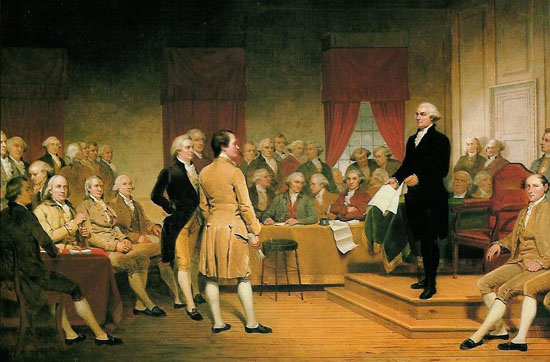
The Constitution arguably failed because the Framers did not anticipate the rise of political parties, judicial review, and universal suffrage. However, the Constitution has quasi-sacred status for Americans. Our Second Amendment right to bear arms is especially important. Symbols matter, and we still have rights under this system.
President Donald Trump failed in many ways, but he forced our opponents to reveal themselves. He also didn’t surrender when any other Republican would have. Corrupt American institutions, especially legacy media outlets, burned through their credibility trying to stop him. Donald Trump didn’t “radicalize” Republicans, he radicalized Democrats. Many of them want to pack the Supreme Court, eliminate the Electoral College, impose sweeping gun control, and create new states that will guarantee Democratic hegemony.
Donald Trump supporters, many of whom think the election was stolen, would call these actions illegitimate. However, the greater truth is that urban elites govern rural whites, and think they are morally suspect bumpkins. There are movements trying to do something about that.
- Greater Idaho – Most voters in Union and Jefferson counties in Oregon voted to ask their local authorities to discuss leaving the state to join Idaho, and create a “Greater Idaho.”
- West Virginia’s governor, Democrat-turned-Republican Jim Justice, said that his state would “stand with open arms” to welcome Virginia counties that wanted to leave the Old Dominion. The West Virginia House adopted a resolution renewing a 158-year-old invitation for Frederick County, Virginia to join the state. Virginia, once conservative, is now essentially governed by Northern Virginia, which is an excrescence of Washington D.C.
- In a non-binding referendum, 72 percent of voters in Bond County, Illinois favored coordinating with other counties in the hope of separating from Cook County, which contains most of Chicago, for the purpose of creating a new state, New Illinois. Hancock County voted the same way.
This wouldn’t be secession; the House and Senate can vote to establish a new state. If a slim Democratic government ratified statehood for Washington D.C., Puerto Rico, and other territories, at least some Republicans would spearhead a movement to create new states and right the balance.
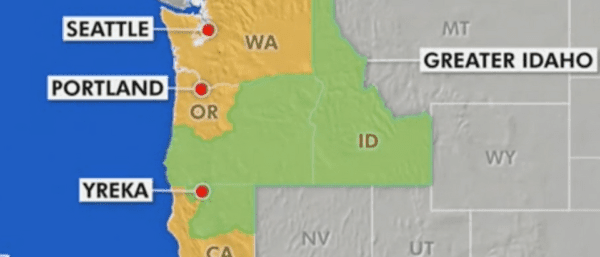
It is not our job to save the GOP from its own stupidity. The point is not to save Republicans, but to have smaller, whiter, conservative areas where white advocates could get a fair hearing and public support. We can also push to rebuild monuments to national heroes. Many Republicans are afraid to talk about race, but if the triumphant Democrats start demanding reparations, gun control, and crackdowns on free speech, the GOP base will react in ways the Establishment can’t control. If the GOP refuses to defend white interests, regional parties, third parties, or even independent candidates could force them to or face certain defeat.
Nature and race realism
All this is necessary but not sufficient for us to make progress. The difficult part will be openly defending race realism. I expect the Biden/Harris Administration will do everything it can to thwart us and that censorship will intensify. White Americans will not someday “wake up” and fight off egalitarian radicalism. There will be no movement unless we organize it.
However, the Democratic leadership may find it hard to keep its own base under control. Revolutions happen when elites can’t meet rising expectations. Leftists and blacks want a lot right now. I anticipate radical demands coming from the Left, with hapless Joe Biden cast as another Lyndon Johnson, wondering why his voters suddenly hate him.
Already, the black mayor of Hyattsville, Maryland has resigned to start a black nationalist political party, Our Black Party, which will get blacks elected to local offices. Rapper Sean “Diddy” Combs supports Our Black Party.
The Black agenda demands for Congress to require regular data collection and reporting from the FBI on the following:
Accurate account of all activities of white nationalist groups.
What the agency has done and is doing to curb white nationalist violence. pic.twitter.com/SkxqsZ2CXq— Our Black Party (@OurBlackParty) November 20, 2020
Many Democrats, including Majority Whip James Clyburn, thought the progressive drive to defund the police cost his party seats in the House. This election was not a “blue wave,” despite white suburbanites, black radicals, and millennial socialists uniting to defeat Donald Trump. What happens when Chuck Schumer and Nancy Pelosi tell the most dedicated and popular progressives or pro-black activists to sit down and obey — yet again? White liberals may be leading BLM movements at universities and in some cities, but self-respecting blacks won’t take this condescension forever.
Other groups in the Left’s Coalition of the Oppressed are vulnerable. Asians are divided about affirmative action; California voters defeated an attempt to resurrect it. Abolishing racial preferences is an issue waiting for some ambitious populist to champion. In this racial free-for-all, white advocates should also demand policies for our benefit. (I suggested some in my “Rhodium Plan.”)
The most interesting question is what Hispanics will do. Chris Roberts explained in October that Hispanics are not monolithic. Offering amnesty won’t win Hispanic support for Republicans. Pedro Gonzalez argued persuasively at American Greatness that Republicans might be better off with a “Caudillismo” message, emphasizing law and order and economic populism. Of course, this is the message that would also win back the white working class votes that Donald Trump lost in 2020 while he talked about the Platinum Plan.
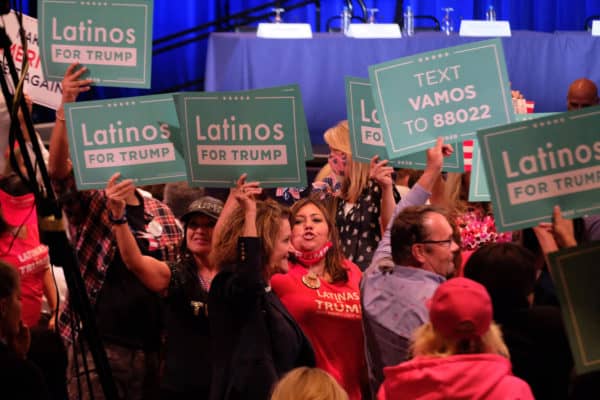
September 14, 2020, President Donald Trump holds a roundtable discussion with Latinos For Trump at the Arizona Grand Resort in Phoenix. (Credit Image: © Christopher Brown / ZUMA Wire)
I don’t think “Hispanic” is even a useful category. The Census Bureau says Hispanics can be of any race. There is no reason whites with even the slightest bit of Hispanic ancestry (or some high school Spanish) shouldn’t check the “Hispanic” box when they apply for jobs or government loans. There’s even debate about whether Portuguese or Brazilians are “Hispanic” when federal money is at stake.
The cynicism of the system
“Liberal elite” is a conservative cliché. It means nothing. It’s an applause line at CPAC. It’s also dangerous because it suggests liberals are superior.
Our message is different. I often use the term “System,” but we should call the government that will take power in January the “Regime.” It’s the united power of Democrat leaders, Big Tech, Wall Street, and media. It’s a power that rules over us, not “our” government. Our relationship to it should be the same we would have towards an occupation we would oppose through peaceful means.
The Regime and its mouthpieces in entertainment and journalism are selfish and cynical. We should never acknowledge their moral standing. We should also express our outrage about our status. It isn’t weak to recognize that you’re a victim; it’s weak to accept it. People fake their identity for economic gain, politicians openly violate the laws they voted for, and the double-standards on race are becoming even more incoherent. The Regime relies on economic blackmail, media slander, and arbitrary law enforcement. It has lost its legitimacy not just in the eyes of white advocates, but in much of the country.
This is a once-in-a-lifetime opportunity, but it requires sacrifice. I’m not asking people to economically martyr themselves by speaking truth to power. Instead, make a plan about where you will go, whom you can work with, and what you can realistically accomplish. We need only a small number of people who can speak out without being socially and financially ruined. The movement is far more serious and capable than it was in 2015 when the “Alt Right” was at its peak. The movement in-fighting will fade, because it is easier to unite in opposition and there will be no more tactical debates about whether to defend Donald Trump.

Across the continent, I see new economic and social systems and support networks. I see European-Americans finding ways to survive this Regime and thrive amidst the ruins. I have more hope now than I’ve had since 2017. While everyone will have his own plan, there is a clear way forward. We can build on our American traditions, help drive apart the Left’s coalition, and radically critique the existing power structure. I’d argue we’re in a better position than we were in 2016. Everyone knows the stakes and no one is under any illusions. I’m excited.















